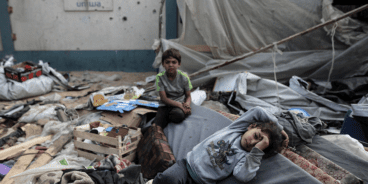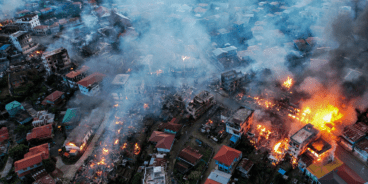
Atrocity Alert No. 72: Myanmar (Burma) and Central African Republic
Atrocity Alert is a weekly publication by the Global Centre for the Responsibility to Protect highlighting situations where populations are at risk of, or are enduring, mass atrocity crimes.
Myanmar (Burma)
After almost four weeks of so-called “clearance operations” by the security forces, nearly half of Myanmar’s ethnic Rohingya population has fled the country, with more than 420,0000 people, including 250,000 children, arriving in Bangladesh since 25 August.
Satellite imagery obtained by Human Rights Watch shows that at least 210 Rohingya villages in Rakhine State have been burned and destroyed. Actions taken by the Myanmar security forces indicate a clear, targeted and sustained policy of ethnic cleansing aimed at expelling the Rohingya minority from the country.
In her first major televised address on the crisis, on 19 September State Counsellor Aung San Suu Kyi spoke of the need to uphold human rights in Myanmar. She also raised the plight of other ethnic minorities who had been affected by violence unleashed since 25 August. However, the State Counsellor’s speech failed to specifically address the reality of ethnic cleansing in Rakhine State and the security forces’ campaign of extrajudicial killings and forced displacement.
The State Counsellor also asserted that the government was prepared to repatriate refugees who can establish that they are Myanmar nationals, ignoring the fact that the overwhelming majority of Rohingya lack such documentation as a result of previously being denied citizenship due to discriminatory laws.
Yesterday, 19 September, the government of the United Kingdom announced that it was suspending financial aid and training programs with Myanmar’s military. All UN member states with significant ties to Myanmar’s security forces should immediately take similar action.
As world leaders gather at the annual UN General Assembly in New York this week, they have a responsibility to draw attention to the ethnic cleansing of the Rohingya and put pressure on the Myanmar authorities – particularly State Counsellor Aung San Suu Kyi and Sr. Gen. Min Aung Hlaing – to immediately stop the violence and facilitate the voluntary return of Rohingya refugees.
The UN Security Council should also impose an arms embargo on the Myanmar military and targeted sanctions directed at senior officers with command responsibility for forces engaged in ongoing ethnic cleansing.
Central African Republic
Friday, 15 September 2017, marked three years since the UN Multidimensional Integrated Stabilization Mission in the Central African Republic (MINUSCA) began its operations. Despite political advances made in the Central African Republic (CAR), such as President Faustin Archange Touadéra taking office on 30 March 2016 following relatively peaceful elections, recent fighting between armed groups from the anti-balaka, the Front Populaire pour la Renaissance de la Centrafrique (FPRC) and the Union pour la Paix en Centrafrique (UPC) has reached levels not seen since the height of the conflict during 2014.
In a climate of growing insecurity, impunity and lawlessness, armed groups continue to fight over resources and trade routes in CAR, targeting ethnic and religious communities in the process. An estimated 1.1 million people remain displaced by violence in CAR, with a 37 percent increase in the past three months in the number of displaced civilians.
Due to the deteriorating security situation, MINUSCA is no longer fit for purpose. Armed groups still control nearly 70 percent of the country and the CAR government is unable to provide adequate protection to civilians who live outside of Bangui, the country’s capital.
A leaked report reveals that MINUSCA’s leadership has appealed for the authorization of 750 additional troops to help fill a “security vacuum” in the southeast of the country. As the UN Security Council prepares to review MINUSCA’s mandate, it should authorize an immediate increase in troops and help improve the protective capacity of the peacekeeping mission. The Council should also authorize the establishment of an additional Quick Reaction Force within MINUSCA and continue to support the CAR government’s efforts to uphold its responsibility to protect all its people.
Related Publications


